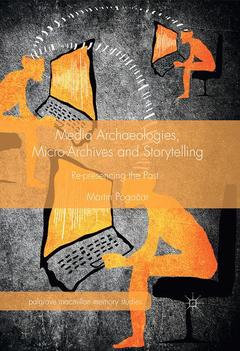Description
Media Archaeologies, Micro-Archives and Storytelling, 1st ed. 2016
Re-presencing the Past
Palgrave Macmillan Memory Studies Series
Author: Pogačar Martin
Language: English
Subjects for Media Archaeologies, Micro-Archives and Storytelling:
Publication date: 09-2016
Support: Print on demand
Support: Print on demand
Description
/li>Contents
/li>Biography
/li>
This book argues that today we live in the culture of the past that delimits our world and configures our potentialities. It explores how the past invades our presents and investigates the affective uses of the past in the increasingly elusive present. Remembering and forgetting are part of everyday life, popular culture, politics, ideologies and mythologies. In the time of the ubiquitous digital media, the ways individuals and collectivities re-presence their pasts and how they think about the present and the future have undergone significant changes. The book focuses on affective micro-archives of the memories of the socialist Yugoslavia and investigates their construction as part of the media archaeological practices. The author further argues that these affective practices present a way to reassemble the historical and relegitimize individual biographies which disintegrated along with the country in 1991.
1.Introduction: Homo Memonautilus?.- 2.Memory, Media, Technology.- 3.Archaeology, Archiving, Post-socialist Affectivity.- 4.Museums and Memorials in Social Media.- 5.Popular Music Between the Groove and the Code.- 6.Memory in Audiovision.- 7.Conclusion: Unsee and Unforget
Martin Pogačar is a researcher at the Institute of Culture and Memory Studies, Research Centre of the Slovenian Academy of Sciences and Arts, Slovenia. His research focuses on the intersections of media and memory studies, post-socialist Yugoslavia and nostalgia, digital memorials, archives, and media archaeology. His recent publications include ‘Digital Afterlife: Ex-Yugoslav Pop Culture Icons and Social Media’, in Post-Yugoslav Constellations, Vlad Beronja and Stijn Vervaet (eds.), 2016; ‘Digital heritage: co-historicity and the multicultural heritage of former Yugoslavia’ (Two Homelands: migration studies 39(2), 2014).
© 2024 LAVOISIER S.A.S.

